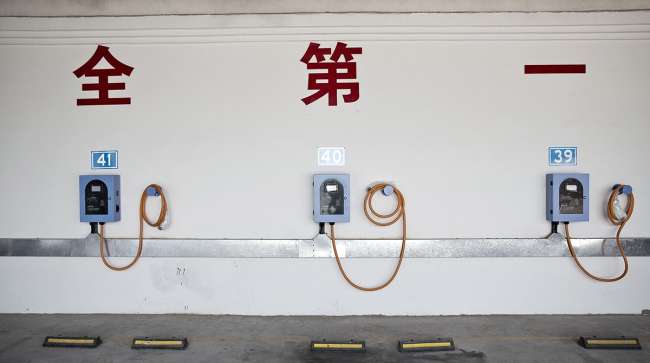Chargers for EVs in Taiyuan, Shanxi province, China. Taiyuan became the first city to replace its entire fleet of taxis with electric vehicles. (Qilai Shen/Bloomberg)
More and more Chinese trucks are being powered by batteries, another sign that oil-based fuels are getting shoved to the sidelines in an increasingly electrified economy.
Government incentives are boosting sales of electric trucks in a sector that has traditionally run on diesel, a fuel that makes up over a quarter of Chinese oil demand. Gasoline, which accounts for more than a fifth, is already in long-term decline because of the rapid adoption of battery-powered cars.
Electric trucks accounted for 22% of light-duty commercial vehicle sales in April, from 13% in the same month last year, according to BloombergNEF. For bigger rigs, the increase is even more pronounced, with sales trebling to 15% of the total. Diesel demand is being menaced on two fronts, as liquefied natural gas had already been making inroads as a trucking fuel in recent years.
As the world’s biggest oil importer, major shifts in China’s transport sector create waves on global energy markets. The threat to diesel is stark. More than 70% of the fuel’s consumption in China is tied up in road freight or the vehicles that work mines and construction sites, according to Amy Sun, an analyst at GL Consulting.

The central government is leading the charge on incentives to switch from fossil fuels, with tax breaks on electric vehicle sales that include trucks. Local governments, meanwhile, are busy trying to lift economic growth via trade-in programs that also reward EV sales.
Apparent demand for diesel in China, which includes production and imports, fell 8.4% year-on-year in April to 3.78 million barrels a day. Consumption will drop 26% by the end of the decade from last year’s levels, according to a briefing by Sun at GL Consulting last week.
Right now, electric trucks are mostly used over short distances or at single sites such as ports and mines, she said. But that should change as batteries become longer-lasting and more charging stations are built.
Electric trucks could jump to 50% of new sales in the next three years, said Robin Zeng, chairman of energy storage giant Contemporary Amperex Technology Co. Ltd. Zeng made his forecast last month at the company’s launch of a new battery for heavy-duty trucks.
After the U.S. and China agreed in Geneva to lower tariffs from astronomical heights, tensions are now surging over access to chips and rare earths. And Beijing increasingly appears to have an edge.
China’s coal-to-chemicals industry has reached massive proportions, consuming about 380 million tons of coal, making it the world’s third-largest consumer.
In northern China, road surfaces have soared to 158 degrees. In California’s Central Valley, temperatures are reaching into the triple digits Fahrenheit. Across much of Spain, the mercury has risen so high that it’s prompting warnings for tourists.
Weaker economic activity in China could reduce the need for the country to purchase additional LNG, further easing global competition for the super-chilled fuel.






